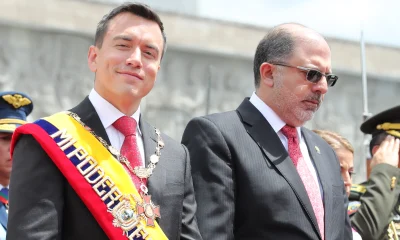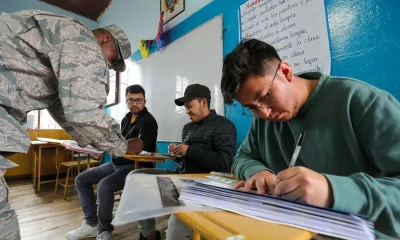International
Noboa assures that Ecuador has a new face with more security after six months in office
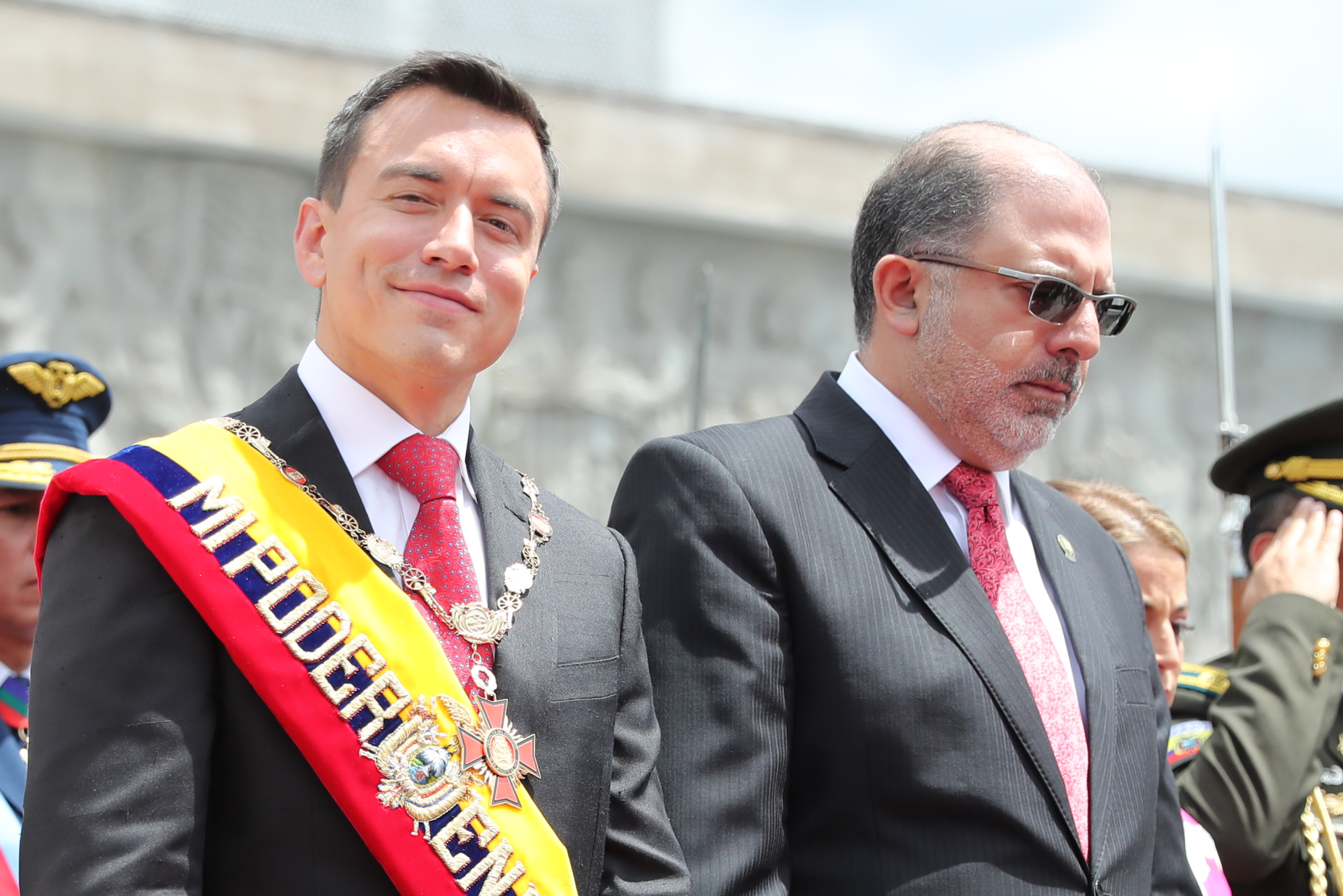
The president of Ecuador, Daniel Noboa, assured this Friday in his first report to the nation that, in the six months of his mandate, he has achieved a country with a new face thanks to efforts to combat insecurity and for the recovery of institutionality.
In his message to the National Assembly (Parliament), a day after having served six months as head of state, Noboa asserted that he received a country “with fear and without hope,” so he had to take “hard” decisions that other administrations did not dare, in search of a safe country, open to investments, job creation and to “guaranteee the future of all.”
The president said that last January 9 will be a date that the country will not forget, having revealed the scope of “the horror of terrorism”, with a series of attacks and violent actions of organized crime such as the taking of the TC Televisión channel by a group of armed men and simultaneous riots in various prisons with about 200 hostages.
That day, on which he again denounced an attempted coup d’état against him, Noboa declared the “internal armed conflict” against 22 criminal gangs linked to drug trafficking, whom he called terrorists.
The actions of the Government, he said, seek to “start building a country where tranquility and progress are the norm and not the exception.”
He highlighted the commitment and sacrifice of the security forces to fight the mafias that “have accomplices and allies, at all levels of the country: public institutions, public companies, local governments, in our neighborhoods, they are everywhere.”
Despite the changes he reported about, Noboa said that the fight for “the ‘New Ecuador’ has only begun,” he pointed out that social transformation and security are also achieved “with employment, education, with services and empathy” with social actions that reveal “the face of a new Ecuador that grows.”
In that line, he also mentioned the efforts in the energy field of his Government, which in April had to face blackouts in the face of a serious electricity crisis, due to the drought of one of the main hydroelectric complexes in the country.
“We are working very hard to solve the energy crisis, in such a way that Ecuadorians, in the future, do not have to go through more energy rationing. In other words, we are cleaning up what those of the past mudded,” he said.
In the economic area, Noboa mentioned the existence of 105,000 young employment places, the ratification of two trade agreements (with China and Costa Rica) and the reduction of 1,000 points in the risk premium.
Noboa claimed to have recovered the country’s institutionality by asserting that “the new Ecuador does not deal with drug trafficking, drug policy, terrorists or any of its historical costumes.”
“The new Ecuador also does not give in to external pressures or even from citizens who call themselves Ecuadorians and even want their country to be sentenced,” he said, without referring to any specific person, although the day before he sent on social networks “to cry to tears” to former President Rafael Correa for his statements regarding the crisis with Mexico.
Noboa did not speak in his speech about the assault on the Mexican Embassy in Quito in April, to capture Jorge Glas, former vice president of Rafael Correa, which caused the breakdown of relations with the Mexican Government, as well as the almost unanimous condemnation of the international community.
After that assault, Correa considered that the country should receive pressure from the international community at the political and legal level as a precedent so that a similar situation does not happen again.
Noboa committed himself to his compatriots to “not go back” and “never stay in the problem or in the comfort of the excuse,” but to move forward to “find and travel clean roads that allow the problems of Ecuadorians to be solved.”
And he explained that he follows the lessons that formed his generation: “to be strong so that no one defeats you, to be noble so that no one humiliates you, to be humble so that no one offends you and to continue to be you so that no one forgets you.”
“In just six months we are achieving what other governments did not do in two, nor four, or ten years,” he said.
International
Bolivia Orders Three Investigations Into Deadly Military Plane Crash
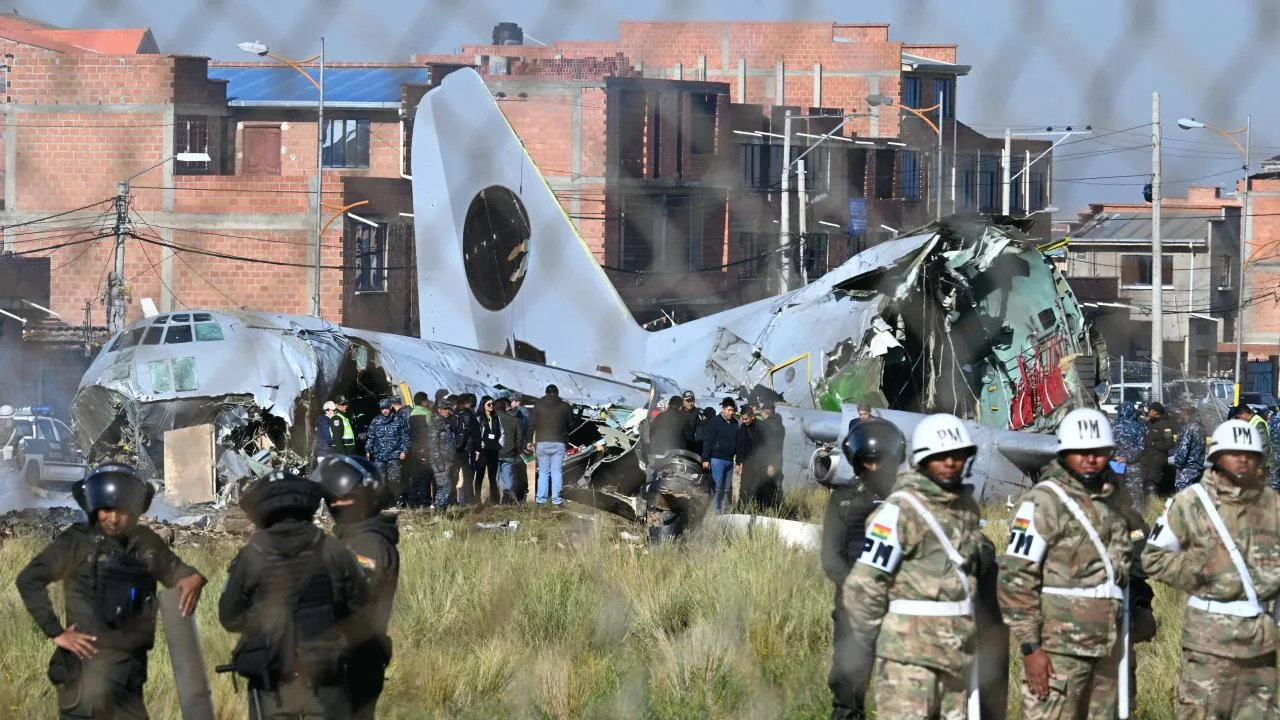
Bolivia’s Defense Minister Marcelo Salinas announced Monday that three separate investigations will be conducted into Friday’s crash of a military cargo aircraft at El Alto International Airport, near La Paz, which left at least 22 people dead.
The Hercules aircraft, operated by the Fuerza Aérea Boliviana (FAB), was transporting cash intended for the Central Bank of Bolivia when it overshot the runway after landing from the city of Santa Cruz. The plane reportedly traveled nearly one kilometer beyond the airport perimeter.
The incident sparked chaotic scenes, with individuals attempting to collect scattered banknotes. Authorities detained 51 people in the aftermath, and the government declared three days of national mourning.
Multiple Investigations Underway
The first inquiry is being led by a military board from the Bolivian Air Force, which has already taken custody of the aircraft’s black box for analysis.
Minister Salinas said two additional investigations will follow — one conducted by the insurance company and another by the aircraft’s manufacturer.
“At least two more investigations will come, that of the insurance company and that of the aircraft manufacturer,” Salinas said during a press conference in Santa Cruz.
He cautioned that the investigative process could take between three and six months, noting that the black box cannot be opened in Bolivia due to the lack of specialized laboratories for analysis.
Awaiting Official Findings
Salinas stressed that the FAB investigative board is the highest authority in the case and urged the public to wait for its conclusions to avoid speculation about the causes of the crash.
He also confirmed that the government has contacted the families of the 22 victims and the 37 injured, as well as the owners of 15 damaged vehicles, to coordinate procedures with the insurer and cover the corresponding expenses.
International
Mexico Calls for Immediate Probe After National Dies in ICE Custody
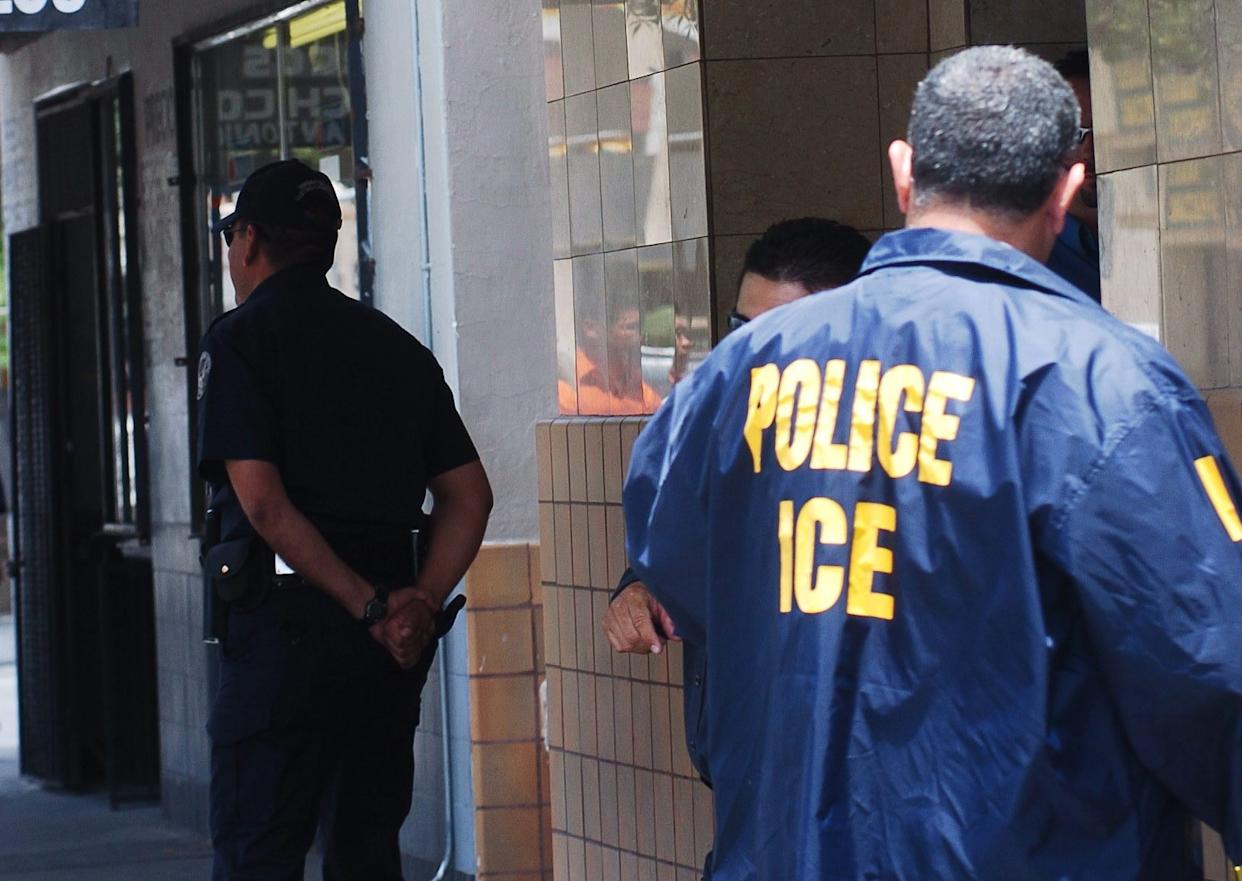
Mexico’s Secretaría de Relaciones Exteriores (SRE) on Monday called on U.S. authorities to conduct an “immediate and thorough” investigation into the death of a Mexican national while in custody of U.S. Immigration and Customs Enforcement (ICE) at a processing facility in California.
In a statement, the Mexican government described the death as “regrettable” and urged U.S. officials to clarify the circumstances surrounding the case in order to “determine responsibilities and ensure that such events do not happen again.”
Death at Adelanto Processing Center
According to available information, the Mexican citizen died at the Adelanto Processing Center in California while under ICE custody. Authorities have not yet released the individual’s identity or the cause of death.
Following the incident, Mexico’s Foreign Ministry formally requested “detailed information” from U.S. authorities, including the detainee’s medical records and custody reports.
Consular Assistance Activated
The Mexican Consulate in San Bernardino, California, has activated consular assistance protocols to provide ongoing support to the deceased’s family. Officials have contacted relatives to express condolences and offer legal guidance, as well as assistance with the necessary procedures to repatriate the remains.
“The handling of situations like this and the establishment of mechanisms to resolve them are priorities for the Government of Mexico,” the Foreign Ministry said, adding that it will formally request an investigation into any systemic conditions that may have contributed to such incidents.
Local Mexican media reported that seven Mexican nationals died while in ICE detention last year — the highest number recorded since the agency was created.
International
Anti-ICE Billboard Campaign Targets Immigration Spending in 31 U.S. Cities

More than 200 billboards criticizing U.S. Immigration and Customs Enforcement (ICE) began appearing Monday in 31 cities across the United States, including Miami, as part of a campaign highlighting the high cost of immigration enforcement operations for taxpayers.
The initiative, titled “ICE Costs Us,” was launched by the civil rights organization Mijente and will run for four weeks.
Criticism of Spending and Enforcement Tactics
The billboards feature images of ICE agents during arrests or carrying military-style weapons. According to the organization, spending on military-grade equipment for the agency has increased by 600 percent in recent years.
Several signs display messages such as:
“Your taxes are being wasted” and “ICE’s cruelty costs you $28 billion,” referring to the agency’s annual budget.
In a statement, Marisa Franco, co-founder of the Mijente Support Committee, said:
“For too long, our government has prioritized building cages and investing billions in an immigration enforcement apparatus that has left families torn apart and communities terrified.”
She added that “Millions of Americans are living paycheck to paycheck, yet this violent agency continues operating with a blank check. These decisions do not make us safer nor improve our economic security. Our billboards highlight these choices and demand a different path.”
Budget Debate and Medicaid Comparison
The campaign also draws a comparison between ICE’s funding and the estimated 17 million people who could lose health coverage under Medicaid due to federal budget cuts under President Donald Trump.
Other billboard messages seen in various cities include:
“They get billions to beat us; we get layoffs and rising rents” and “Funding ICE is a fast track to fascism.”
Organizers say the goal is to spark public debate about the allocation of federal funds for immigration enforcement and the broader economic and social impact of such policies on communities nationwide.
-

 International4 days ago
International4 days agoCocaine Production Surges 34% in 2023 as Market Expands into Africa and Asia
-

 International3 days ago
International3 days agoTrump Floats “Friendly Takeover” of Cuba Amid Rising Tensions
-

 International2 days ago
International2 days agoIran Reports 201 Dead, 747 Injured After U.S. and Israeli Strikes
-

 Sin categoría2 days ago
Sin categoría2 days agoTrump: ‘We Think It’s True’ Amid Claims Iran’s Supreme Leader Was Killed
-

 International2 days ago
International2 days agoSecurity Council to Hold Emergency Meeting on Middle East Crisis
-

 International4 days ago
International4 days agoFederal Judge Blocks Trump Policy Allowing Deportations to Third Countries
-

 International3 days ago
International3 days agoArgentina’s Senate Reviews Milei-Backed Labor Overhaul
-

 International2 days ago
International2 days agoPope Leo XIV Urges End to ‘Spiral of Violence’ in Middle East
-

 International11 hours ago
International11 hours agoBrazil’s Supreme Court Rejects Bolsonaro’s Bid for House Arrest
-

 International4 days ago
International4 days agoClinton Accuses Republican Committee of Using Epstein Case to Shield Trump
-

 International10 hours ago
International10 hours agoAnti-ICE Billboard Campaign Targets Immigration Spending in 31 U.S. Cities
-

 International10 hours ago
International10 hours agoTrump Warns of ‘Major Wave’ of Attacks as Iran Conflict Escalates
-

 International10 hours ago
International10 hours agoMexico Calls for Immediate Probe After National Dies in ICE Custody
-

 Central America10 hours ago
Central America10 hours agoPanama Canal Monitoring Trade as Middle East Conflict Disrupts Shipping
-

 International10 hours ago
International10 hours agoBolivia Orders Three Investigations Into Deadly Military Plane Crash



























